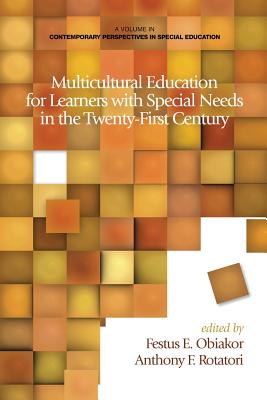Multicultural Education for Learners with Special Needs in the Twenty-First Century

Multicultural Education for Learners with Special Needs in the Twenty-First Century
A volume in Contemporary Perspectives in Special Education Series Editors: Anthony F. Rotatori, Saint Xavier University and Festus E. Obiakor, Valdosta State Univversity Multicultural Education for Learners with Special Needs in the Twenty-First Century provides general and special educators innovative information that address the road blocks to effective practice such that diverse learners will be appropriately; identified, assessed, categorized, placed and instructed. The book provides those who instruct diverse learners comprehensive, creative and best practice chapters by scholars in the area of multicultural education. Chapter One presents a system to reduce traditional education road blocks that confront diverse learners called Culturally and Linguistically Responsive Teaching (CLRT). The CLTR system is designed to accomplish three objectives, namely, to increase student achievement, to help students develop skills to achieve economic sufficiency and to allow students to acquire citizenship skills based on a realistic and thorough understanding of the political system. Chapter Two discusses the pervasive problem of disproportionate representation of students from diverse backgrounds in special education by examining what it is, who is impacted by it, why it is occurring, and how it can be addressed using promising strategies. Chapter Three examines the use of authentic assessment to provide feedback for teachers and students, and guide the instructional process by differentiating teaching to meet the educational needs of diverse learners. Chapters Four, Five, Six and Seven address issues related to educating Latina/o Americans, African Americans, Asian Americans and Native Americans learners with special needs. Chapter Eight is a unique chapter that addresses the growing need to educate foreign-born immigrants who are now being referred to as "Today's Special Learners in Schools". This chapter delineates the use of the Comprehensive Support Model (CSM) to educate foreign-born learners who are identified by the authors as foreign-born English Language Learners. The CSM is recommended as a culturally sensitive intervention that integrates efforts of the self, (i.e., learner), families, school, community, and government in responding to the needs of diverse learners. Chapter Nine provides a comprehensive discussion of how Culturally Relevant Leadership (CRL) can impact educational theory and practice. The authors delineate how CRL leads to reflectiv
PRP: 474.30 Lei
Acesta este Prețul Recomandat de Producător. Prețul de vânzare al produsului este afișat mai jos.
379.44Lei
379.44Lei
474.30 LeiLivrare in 2-4 saptamani
Descrierea produsului
A volume in Contemporary Perspectives in Special Education Series Editors: Anthony F. Rotatori, Saint Xavier University and Festus E. Obiakor, Valdosta State Univversity Multicultural Education for Learners with Special Needs in the Twenty-First Century provides general and special educators innovative information that address the road blocks to effective practice such that diverse learners will be appropriately; identified, assessed, categorized, placed and instructed. The book provides those who instruct diverse learners comprehensive, creative and best practice chapters by scholars in the area of multicultural education. Chapter One presents a system to reduce traditional education road blocks that confront diverse learners called Culturally and Linguistically Responsive Teaching (CLRT). The CLTR system is designed to accomplish three objectives, namely, to increase student achievement, to help students develop skills to achieve economic sufficiency and to allow students to acquire citizenship skills based on a realistic and thorough understanding of the political system. Chapter Two discusses the pervasive problem of disproportionate representation of students from diverse backgrounds in special education by examining what it is, who is impacted by it, why it is occurring, and how it can be addressed using promising strategies. Chapter Three examines the use of authentic assessment to provide feedback for teachers and students, and guide the instructional process by differentiating teaching to meet the educational needs of diverse learners. Chapters Four, Five, Six and Seven address issues related to educating Latina/o Americans, African Americans, Asian Americans and Native Americans learners with special needs. Chapter Eight is a unique chapter that addresses the growing need to educate foreign-born immigrants who are now being referred to as "Today's Special Learners in Schools". This chapter delineates the use of the Comprehensive Support Model (CSM) to educate foreign-born learners who are identified by the authors as foreign-born English Language Learners. The CSM is recommended as a culturally sensitive intervention that integrates efforts of the self, (i.e., learner), families, school, community, and government in responding to the needs of diverse learners. Chapter Nine provides a comprehensive discussion of how Culturally Relevant Leadership (CRL) can impact educational theory and practice. The authors delineate how CRL leads to reflectiv
Detaliile produsului










